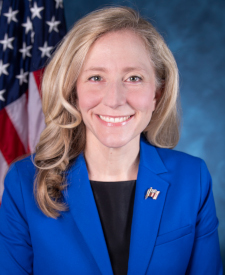Legislators
Bills
Statements
Lobbying
Travel
- Statements
- Congressional Survey on Hate Crimes
- Abigail Spanberger
Response of Abigail Spanberger (D-Va.)

Represents Virginia's 7th Congressional District. She is serving her third term in the House.
The Questions
- Are hate crimes a problem in your state?
- Should Congress do something about hate crimes and white supremacist violence in your state? If so, what specifically?
The Response
1. “Yes. The Virginia State Police reported a 50 percent increase in hate crimes committed in Virginia in 2017. And in Central Virginia, we have seen acts of hate disrupt and bring fear to our own communities. We’ve had schools and children’s camps vandalized with racist and anti-Semitic slurs and violent words. We have had KKK members pushing their racist ideology and recruiting in-person and via leaflets. And of course, we watched the events of Charlottesville unfold, as white nationalists marched through the streets of a Virginia city. "Neighbors across our community feel unease, less safe, and more concerned, particularly our neighbors who are religious minorities or people of color. We must all work to fight these ideologies of hate and ensure they do not take hold and cannot manifest in violence.” 2. “Congress has taken multiple concrete steps to confront white nationalism. First and foremost, we voted to denounce white nationalism, racism, and all forms of bigotry on the floor of the House, and while this vote was symbolic, it signals the priority this Congress places on addressing the rise of white nationalism. “To combat the crimes and violence associated with the ideologies of hate, we have introduced multiple pieces of legislation to confront white nationalism and the threat of domestic terrorism, including the Domestic Terrorism Prevention Act (H.R. 1931), the Domestic Terrorism DATA Act (H.R. 3106), the No HATE Act (H.R. 3545), and the Confronting the Threat of Domestic Terrorism Act (H.R. 4192). These bills would allow law enforcement heightened ability to track hate crimes and acts of domestic violence, provide community members an avenue to report such crimes, and give our law enforcement officers direct criminal statutes under which to investigate and charge those who commit acts of domestic terrorism.” The events that took place in Charlottesville two summers ago can be seen as a national microcosm for hatred and white supremacy. In what ways do you think locally, state, and federally Virginia can be a national leader on addressing and preventing hate crimes? “The events in Charlottesville in 2017 are seared into the memory of millions of Virginians and tens of millions of Americans. In the wake of that deadly and disturbing weekend, we saw President Trump refuse to denounce the poisonous actions of white supremacists who marched with torches, proudly displayed Swastikas, and shouted anti-Semitic, racist, and xenophobic creeds. Without unequivocal, clear condemnation, we risk empowering those who spread hate, violence, and vitriol to commit similar acts in the future. “So first, we need to be clear—federal, state, and local leaders have an obligation to speak out forcefully against hate in all its forms. Since arriving in Congress, I’ve worked to denounce anti-Semitism and racism and to speak out against those who’ve threatened the security of our neighbors in Central Virginia. I don’t plan on straying from that path, and I hope all Virginia leaders will demonstrate resolve when facing the threat of white supremacist violence.”
- Date Aug. 26, 2019
- Reporter Charlotte Woods of Charlottesville Tomorrow
 Searching...
Searching...